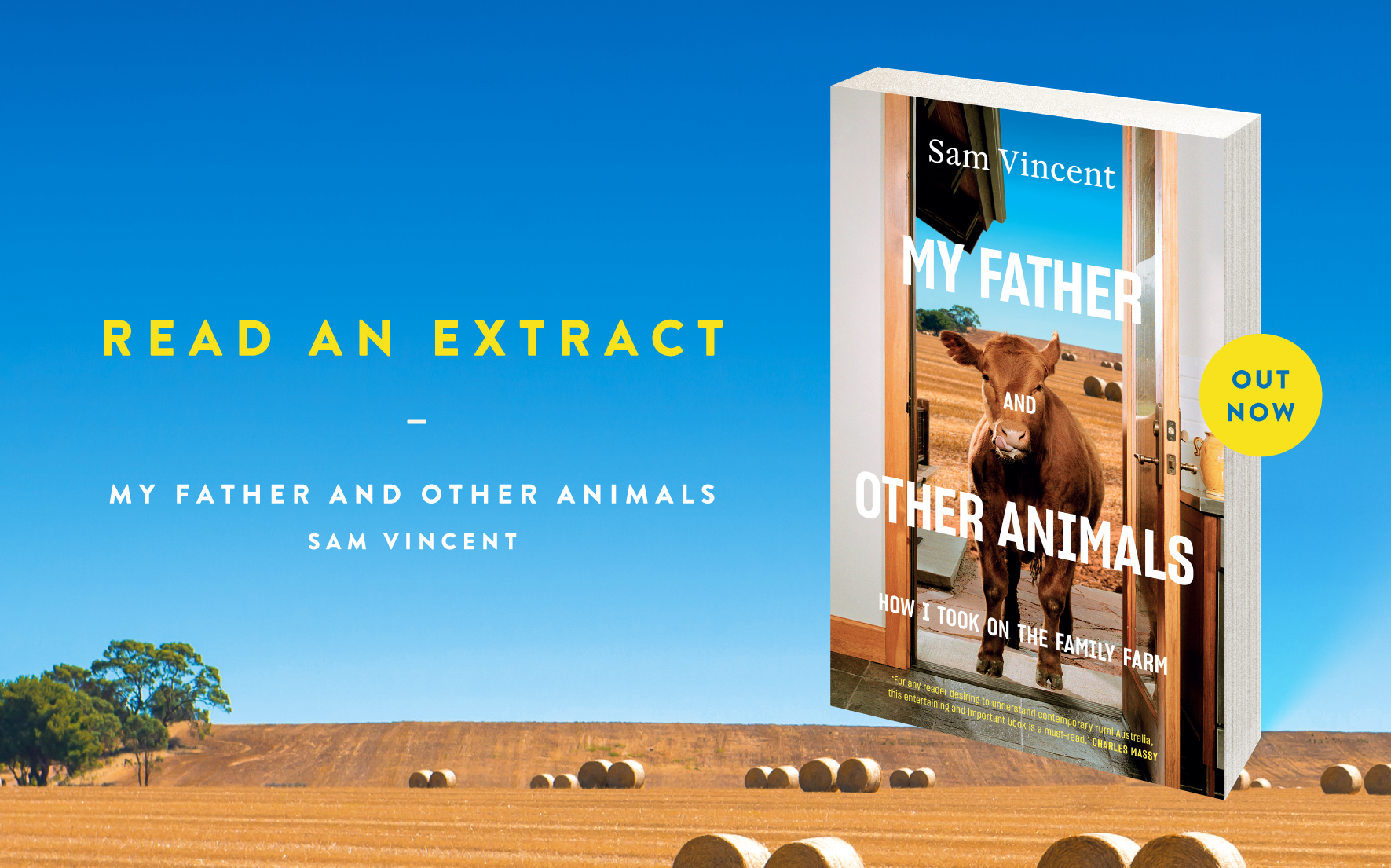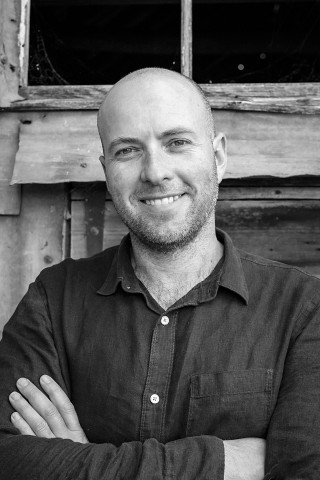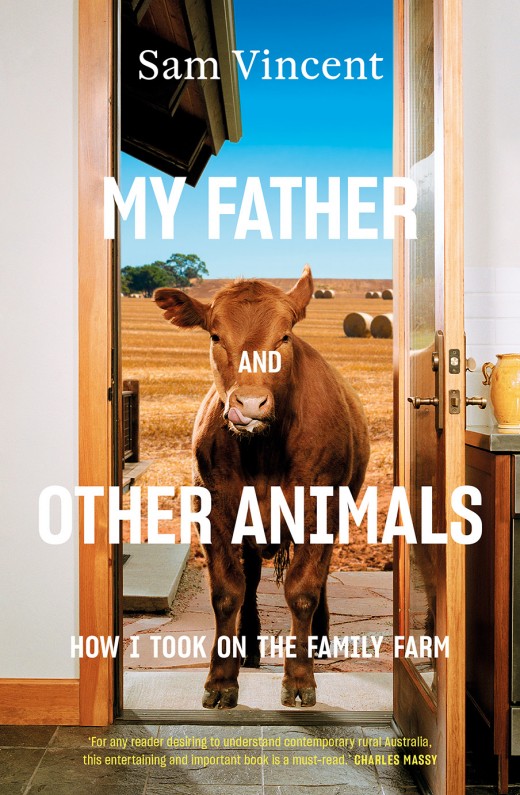News

News >
Summer of Reading: My Father and Other Animals
Part of our Summer of Reading series: A moving and hilarious fish-out-of-water memoir of a millennial leaving his inner-city life to take over the family farm.
When we were kids, my sisters and I weren’t allowed to watch TV during dinner. The risk of seeing John Howard was too much for my parents to bear. In the months after he became prime minister in 1996, Mum and Dad wore their opposition proudly, chortling of his imminent demise and slapping a ‘Don’t blame me, I voted Labor’ sticker on our dusty family van.
But as the Howard months became the Howard years, their mood turned first to frustration – Dad no longer referred to him as ‘the miserable little man’ but as ‘the little shit’ or ‘the little dickhead’ – and eventually to censorship. Should the PM slip through their low-fi parental block, unexpectedly popping up on The 7.30 Report beside Kerry O’Brien, he could expect an incoming missile.
But I for one relished what televised glimpses I could manage: those bushy eyebrows, suddenly plucked to make him electorally palatable; the chunky bulletproof vest under his shirt after the Port Arthur massacre; the loud shirts at APEC summits; the louder Wallabies tracksuit on his morning powerwalk … He was a strange sort of fashion icon.
My favourite item in Howard’s wardrobe was his Akubra hat. Reserved for visits to marginal, rural electorates, it was always accompanied by a Driza-Bone coat – irrespective of the forecast – and a pair of R.M. Williams boots.
What I found most intriguing about the hat was its pristine condition. Flat-brimmed, symmetrical and impermeable, it was so different from the hats my father wore – tatty, smelly rags of things, stained lurid pink with herbicide dye and full of holes to facilitate melanoma growth.
I turned thirty in the spring of 2014, my first as a farmhand. In honour of this new direction, and largely in jest, three friends gave me an Akubra for my birthday. It was, its label informed me, the ‘Riverina’ model, one of the largest, deepest and widest styles in the Akubra catalogue, named for the agricultural region in south-western New South Wales where my mother was born, and where Papa once farmed.
It was only when I took it off and studied it – flat-brimmed, symmetrical and impermeable – that I realised what I had been gifted: Howard’s hat. In becoming Dad’s deputy sheriff, I resembled the Deputy Sheriff. And wearing it made me feel as much of a phoney.
The hat came between father and son, interrupting what I’d naïvely construed as a budding bromance. The thing was hard to ignore: I had to doff it as I entered the ute to avoid hitting my head on the roof, but putting it on the dashboard made visibility difficult.
Dad thought I looked ridiculous, and he said so. ‘The bigger the hat,’ he quipped on a near-weekly basis, ‘the smaller the brain beneath it.’
Because as well as prime ministers courting the pastoral vote, this suspiciously clean, oversized mélange of rabbit pelts was the headgear of hobbyists, of weekend warriors. In New South Wales they are derided as ‘Pitt Street farmers’ and in Victoria as ‘Collins Street farmers’. The difference between them and me was, Pitt Street farmers have high-powered jobs on Pitt Street. They can be hobby farmers because they have jobs to support their hobbies.
What was my job? I wasn’t a farmhand, because Dad wasn’t paying me to help him at Gollion, and by his own definition, Gollion wasn’t a real farm. I wasn’t an apprentice, because that implied the acquisition of a trade – and the eventual promotion to master. There was already an incumbent farmer; we had not discussed succession. I was more like an unpaid intern: a work experience kid with no guarantee of future employment.
Dad knew I was a writer, but he considered that my hobby (I’d overheard him tell a family friend as much), a source of pocket money, maybe a form of intellectual self-improvement. (As well as turning thirty, in September 2014 I published my first book. My father’s feedback was that I ‘should submit it as a PhD’).
That left the two days a week I ‘worked’ as a university research assistant. Dad’s guess at what I did there was as good as mine. I had been employed by an affable professor of politics soon after I graduated, and was promptly given a large, sun-filled office with my name on the door should anyone need to find me. The only person who ever did was the professor, who would apologise for interrupting my frantic minimising of YouTube browsers to tell me what a fine job I was doing. I realise this is more work than many people with office jobs do, but at least they make enough money slacking off to put some aside after paying the rent. The state of my car was an indication to my father that I wasn’t, in his words, ‘getting ahead’.
The Akubra kept the sun off my head as spring turned to summer. But what it deflected in ultraviolet rays the hat seemed to magnify in paternal scorn. On our farming days Dad grew snarky, dismissive. He critiqued the way I held a shovel and dug holes, making me feel as horticulturally competent as a visiting head of state awkwardly posing with a tree they’d ‘planted’ on the south lawn of the White House.
Then there were the pointed comments about my future, grenades he lobbed into moments where silence would’ve suited me just fine:
‘If I were you I’d be focusing on your social life rather than hanging around with your old man.’
‘Why don’t you knock off early today, go and chase some girls …’
‘Many of your friends interested in agriculture, are they?’
Worst was when he suggested I should ‘chat up’ one of the ‘lovely Asians’ at the university campus where I worked. A Chinese nurse had recently complimented the volume of his chest hair as she shaved it off during a minor medical procedure, propelling all women of Asian heritage to the top of his future-daughter-in-law wish-list. The creepiness of the construction – lovely Asians – illustrated why discussing potential mates with my father was to be avoided at all costs. One evening in Canberra a few weeks earlier, a non-farming day, I was eating a kebab alone on a bench when I spied him walking to the community centre where he took German conversational classes. I saw him before he noticed me and shamefully snuck off around the corner lest he raise my sad, dateless dining habits the next time I went to Gollion.
One afternoon we were lying in the dirt, fixing a pump, when he came out with this gem:
‘Your friends would be all buying houses by now, I suppose?’
My friends? There was Frank, whose LinkedIn account featured a one-word résumé: ‘Drifter’. Frank once worked for Greenpeace, chaining himself to bulldozers, but he had been out of work for so long his mother thought him unemployable. He and his partner subsisted off bin-dived bread, home-grown vegetables and roadkill kangaroos. An industrial designer by training, he had recently designed and built a house for his parents using gleaned materials. It cost forty thousand dollars.
Nick? He aspired to Frank’s lifestyle but hadn’t yet acquired the requisite skills, necessitating employment cleaning toilets for social housing tenants. He bin-dived his groceries, though. (I sometimes joined him after late-night drinking sessions; we’d pre-emptively ward-off hangovers by feasting on low-quality barbecue chickens. Raised on battery-farms, they retailed for just $8.99, yet still ended up in the dumpster. This disgusting expression of industrial agriculture was largely lost on us as we drunkenly tore off drumsticks and wiped our hands on whatever we could reach – trees, grass, the sides of the dumpster itself.) Nick was perhaps the furthest from home ownership of my friends: one summer he contemplated living in a tent on Canberra’s Mount Ainslie, but when he asked if he could shower in my share-house bathroom, my housemates made me talk him out of it.
Benji? He mainly lived out of his car, a 1984 LandCruiser Troop Carrier with a mattress in the back. He parked it alternately on the nature strip outside my share house and at the university (for the free showers), where he was onto his fourth or fifth degree in an attempt to avoid paying off his student loan.
That left Harry, my oldest friend, and the only one to own a house – and that’s because he built it himself. Harry was the scion of agrarian socialists who verged on being ‘real’ farmers, according to Dad’s metric (they produced fine-wool merino on a 3000-acre escarpment). They grew much of their own food and built their own houses. ‘It’s a bit peasanty’, Dad said of their lifestyle.
Being a ‘peasant’ was just about the worst slur in my father’s inventory of insults, connoting medieval amounts of mud and deprivation. The term is used ironically by double-income tree-changers these days as a humble-brag (‘We like to use every part of the pig, from snout to tail’), but my father was not in possession of an Instagram account. Necessity vs lifestyle: in my father’s eyes, that’s what separated the hobbyists from the hicks.
Things came to a head at the end of 2014, a few months since I’d begun helping on the farm. My mother had read that an upcoming bull auction was being held a few gates down from the farm she grew up on in western Victoria; I met her and Dad in Melbourne the morning of the sale, and we drove west across the flat volcanic basalt plains.
At the farm where my mother grew up, the current owner didn’t mind us dropping in unannounced, and was happy to down his welding tools to give us a tour. But it was Mum’s tour, not his: she wanted to show me Koonje, the farm as it had been when she knew it (it was now called ‘Sunny Ride’ or ‘Sunnyside’ or some such): the rows of native seedlings Papa planted as wildlife corridors that were now fully grown (‘he was a very forward-thinking farmer’); the windmills he had set up (he had been chastised by Ma for using his handkerchief to check their oil); the old hay paddock where Mum and her siblings had ‘tanned’ themselves, with predictable results for the pasty children of Anglo-Saxon stock. She was overcome by it all, and we posed for photos to show her siblings.
It was late spring when we visited. Spring was a noisy time at Gollion: the carols and shrieks of willy wagtails and noisy friar birds; the rat-a-tat-tat of restless flycatchers and baleful cries of baby magpies. But here all I could hear was the distant rumble of a tractor ploughing dark, moist soil. It was all so flat, featureless and productive; so foreign to me, having grown up in hilly, marginal, drought-prone Gollion. In so much of Australia, the early settlers had tried to recreate England with predictable failure; here they seemed to have succeeded.
To Dad’s annoyance, by the time we left Koonje we had missed much of the bull sale; his mood deteriorated further when, on arriving at the sale, I produced my Akubra from my suitcase and put it on my head.
On the drive back to Melbourne, I remembered I hadn’t paid my rent. I transferred the money on my phone, then realised I had nothing left over until next pay day. I asked my mother for a loan of petty cash; Dad overheard. ‘Why don’t you get a real job so you don’t have to leech off your mother anymore?’
I asked to be let out and slammed the car door, my Akubra casting long shadows across the streetscape as I stormed off to find the nearest train station.
Then, one morning a few weeks later, an olive branch. At the very kitchen table where I had hatched my plan to become a farmhand four months earlier, my mother suggested something that would change the course of my life. I’d been working so hard helping my father, she said; it might be time to start a farming project of my own.
Dad had already attached the ripper to his tractor.
Share this post
About the author
Sam Vincent’s writing has appeared in The Monthly, The Saturday Paper, Griffith Review and The Best Australian Essays. His first book, Blood and Guts, was longlisted for the Walkley Book Award and in 2019 he won the Walkley Award for longform feature writing. He runs a cattle and fig farm in the Yass Valley, NSW, and supplies fruit to some of the best restaurants in the Canberra region.
More about Sam Vincent




